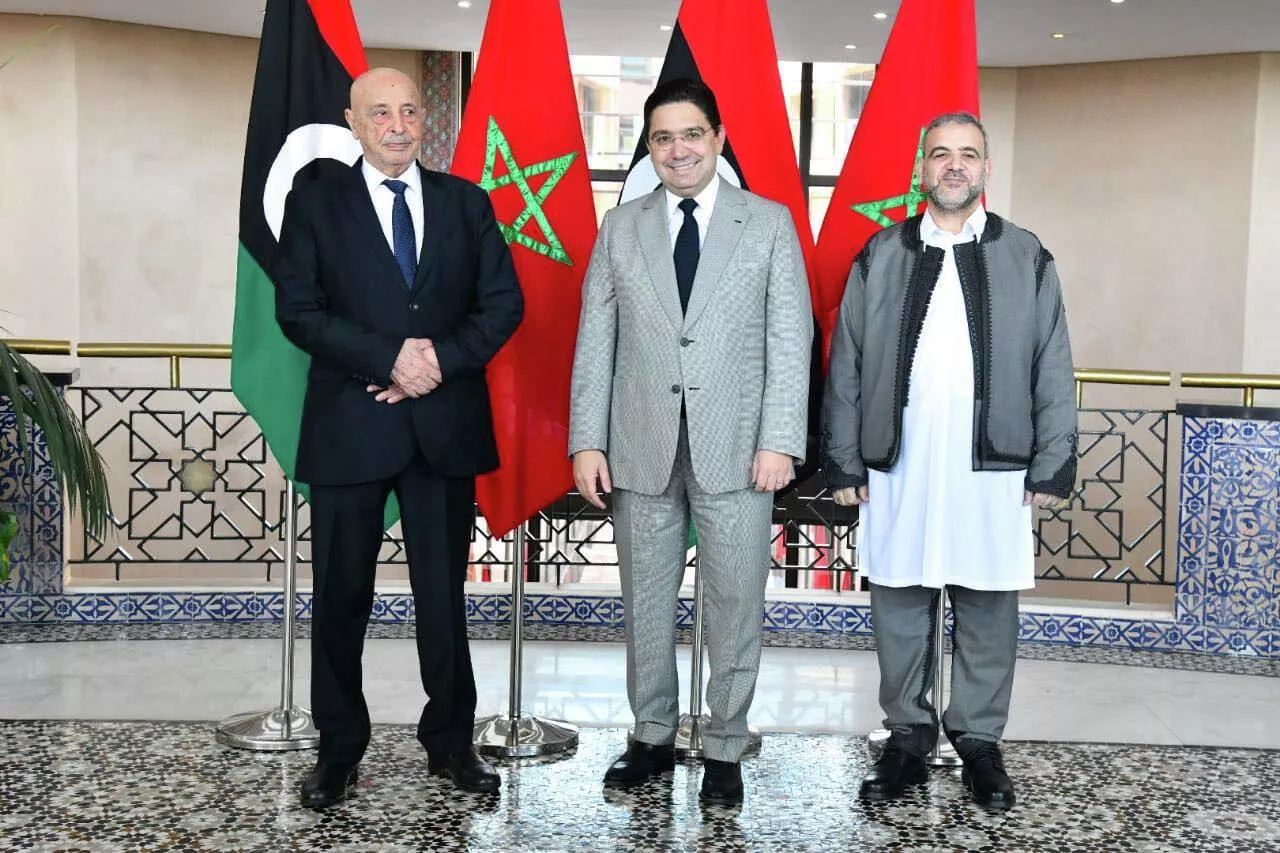The Skhirat Agreement between Libyan factions, signed in 2015 after Moroccan mediation, remains a landmark in Libya’s political trajectory, and Morocco has continued its mediation efforts between Libyan factions since then, with a meeting held in October between leading Libyan figures, in an effort to end Libya’s ongoing crisis.
On October 21st, negotiations took place in the Moroccan capital between the Speakers of the Libyan House of Representatives, and the High Council of State, Aguila Saleh and Khaled Al-Mashri, in which they agreed to implement the Bouznika agreement related to naming the occupants of Libya’s key political positions before the end of the year. In a statement issued after the meeting, referred to implementing the outcomes of the agreement regarding these key positions within the coming weeks, not later than the end of the year. Saleh and Al-Mishri’s statement also called for “the resumption of dialogue to do what is necessary to hold presidential and parliamentary elections, according to clear legislation, in agreement between the two councils.”
The rival parties in Libya had previously met, in Bouznika, 40 kilometers south of the Moroccan capital in September 2020, to agree on the distribution of key positions as well as the maintenance of a ceasefire.
Despite the optimism about the recent agreement, there are difficulties on the horizon regarding its implementation. Reaction came swiftly from Abdel Hamed Al- Debeibah -the Prime Minister of the National Unity Government whose mandate has expired, with an announcement of his rejection. In a post on his Twitter account, on October 21, Debeibah said that “the presidents of Parliament and the State Council must expedite the adoption of a constitutional rule that ends the current problem with the elections.”
In response to Debeibah’s position, Khaled Al-Mashri, posted on Twitter, “The Prime Minister of the Government of National Unity should stop selling illusions to the people”. Noting that Debeibah is commenting on issues outside of his jurisdiction and authority. Differences between the two figures, both from western Libyan, sheds light on the difficulties in implementing this agreement while influential political and military figures in Tripoli oppose it. There remain significant disagreements regarding the methods, mechanisms, and criteria for selecting and allocation and naming the occupants of these key positions.
The objective of Moroccan mediation
Despite these difficulties, Morocco remains engaged in the Libyan crisis, building on its previous efforts in hosting talks between the Libyan parties that led to agreements, such as the Skhirat and Bouznika. Morocco has several goals they would like to achieve, perhaps the most important of which are the following:
Preventing chaos in Libya: Although Morocco does not border Libya, instability in Libya has caused problems for Morocco, especially from the threat of spreading terrorist activity. Moroccan extremists have joined ISIS in Libya and are reported to be planning terrorist operations in Europe from there. Their eventual return to Morocco poses risks to the country’s national security.
Moreover, with a power vacuum in Libya, the possibility of terrorist groups launching their attacks from that country poses a real threat to the entire North African region. This was made abundantly clear when a Chadian rebel group launched an attack from the south of Libya, which led to the death of Chadian President Idriss Deby on April 20, 2021. Additionally, the collapse of Libyan security has allowed arms smuggling, drug trafficking, and other criminal activities to play out with impunity.
Economic Benefit from Energy Agreements: Morocco did not have strong economic ties with Libya, under the regime of Colonel Muammar Gaddafi, but now Morocco is seeking to benefit from new agreements on trade and energy. Moroccan decision-makers are working to reach this goal, the Moroccan Foreign Minister Nasser Bourita announced his country’s intention to organize a bilateral economic forum. In the same month, Libyan Oil and Gas Minister Mohamed Aoun referred to talks being held with Morocco regarding cooperation in the field of renewable energy.
Enhancing Morocco’s diplomatic standing: Morocco’s engagement in mediation efforts between the Libyan parties, clearly aims to strengthen Morocco’s stature on the regional and international levels, and to strengthen Morocco’s international reputation as a “reliable mediator” .
Morocco’s increased involvement in mediation between the Libyan parties is also aimed at keeping Algeria’s influence at bay. However, Algeria has recently reached understandings with Tunisia, Egypt, and Turkey regarding the crisis in Libya, and Morocco fears that its influence in Libya may diminish as a result. This may motivate Morocco to increase its mediation efforts in Libya .
Challenges ahead
Several factors have helped Moroccan diplomats achieve relative success in mediation efforts between the conflicting Libyan parties, including an understanding of Libyan society. Moroccan diplomacy did not try to impose any plan to resolve the crisis, as much as it stressed that the future of Libya should be formulated by the Libyans. This Moroccan neutrality gave it a strong position in the Libyan context, however, there are two main challenges facing Moroccan diplomacy there:
1- Other regional interventions: The Algerian role is the biggest challenge to Morocco in Libya, and Algeria has repeatedly attempted to limit Morocco’s role. For example, Algeria blocked Moroccan attempts to mediate between the Malian government and the Azawad movements, in 2014.
2- The depth of divisions: These divisions have caused the faltering of the path to transition away from the complex legacy of Gaddafi’s rule, which lasted for 40 years. The depth of the Libyan crisis, with two governments and two legislative councils, as well as other divisions, has reflected these difficulties, and may lead the country into civil war, and poses the real threat of dividing the country into three regions: east, west, and south.
Despite various challenges, Morocco is likely to maintain and strengthen its efforts to engage the various Libya parties, and preserve the gains made by the previous rounds of negotiations it hosted. Its aim is to preserve cohesion in Libya, but also to maintain Morocco’s image as a trusted mediator in the Libyan crisis.

